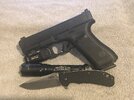Can you see where that might lead to a disasterous understanding?
I used to have to check all the city owned parking garages in Colorado Springs. I've never been in one that was so dark you couldn't see what that guy had in his hands. In fact I've never been in one that wasn't bright enough that you could sit in there and read a book at 3:00 in the morning.
Having said that, if I'm walking in your general direction and you shine a high lumen light in my face I'm going to consider you to be a threat. I would be very likely to seek cover until I found out exactly what the hell was going on.
Is he mumbling or is he telling you to get that ******* light out of his face?
I've noticed shining a flashlight in somebody's eyes in the dark tends to piss them off and escalate situations that don't need to be escalated.
You're right, not every parking garage is a dark parking garage. Not every stairwell is dark. Not every alley is dark. Some are well-lit until they're not, then they become dark. Just because you've never been in a dark parking garage doesn't mean that they don't exist.
I've not advocated for shining a light in anyone's face. If you've taken a quality low light class from a reputable instructor, hopefully he talked to you about controlling the light. This would include not pointing it at places where it shouldn't go, such as someone's face. It would also include "splashing" the beam to provide general illumination in a given space. But yes, shining light's in someone's face for no reason is rude. Which is why it's a good thing no one has advocated for that.
The example I threw out about object in hand + verbal threat was meant to set the initial conditions of the encounter. So no, he's not mumbling at me to get the light out of his face, which no one has said that one should have pointed there in the first place since there's no reason to do so.


 Maybe in their house that might apply, but...
Maybe in their house that might apply, but...